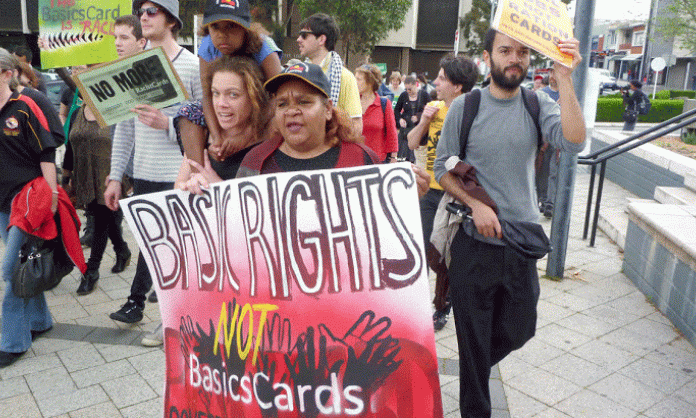The federal government is set to expand its welfare quarantining policy. Otherwise known as “income management”, this is a scheme in which 50-70 percent of a welfare recipient’s income is quarantined on a “BasicsCard”, limiting spending to government-approved shops.
It was introduced as part of the 2007 Northern Territory Intervention targeting the Aboriginal population. It has since been quietly expanded to areas throughout the rest of Australia.
Both major parties claim that welfare quarantining ensures welfare recipients spend their money on essential items.
But an evaluation from what is now the Department of Social Services noted that welfare quarantining “has been applied to many who do not believe that they need income management and for whom there is no evidence that they have a need for or benefit from income management”. The scheme has led, it concludes, “to widespread feelings of unfairness and disempowerment”.
The expansion of the scheme has not gone unchallenged. In Bankstown, in western Sydney, it has run up against stern opposition from the local community and from the Public Service Association, the union that covers state government workers.
Red Flag spoke to a caseworker and PSA member about the effects of income management on the local community, and about the union campaign that has placed work bans on welfare quarantining. The campaign has severely hindered attempts to implement the policy.
“There’s been a good deal of organised, sustained opposition to income management in the Bankstown local government area”, the caseworker said. “The PSA is affiliated with a protest organisation called the Bankstown Coalition. It consists of over 65 local organisations, unions and faith groups.”
Of the government’s expansion of the welfare quarantining scheme, the caseworker noted the “escalating conservative attacks on the living standards and rights of people on income support”.
“In 2009, Tony Abbott made it clear that he would like to see a national income management system in place. [Labor minister] Jenny Macklin indicated similar views. What we’re now seeing are the government’s early preparations to do just that, as they push through a series of new evaluations at … pilot sites.
“The trial sites were chosen for their high concentrations of unemployed youth. There are huge concerns that income management will be expanded to include much larger numbers of young people from within the out-of-home care system.”
The response of union members to this attack on the vulnerable has been heartening. “Since July 2012, the PSA has imposed blanket work bans on the implementation of Child Protection Income Management in the Bankstown area.
“When arguments for the bans were presented to the PSA, the approval for bans was very strong and immediate. The bans have been strongly supported at every level since … In view of the Abbott government’s expansionary push, the bans were recently extended to cover any community services office in New South Wales.
“In spirit, the bans are reminiscent of the green bans imposed by the Builders Labourers Federation in the ’70s … It’s evident from PSA internal discussions and debates that members believe they have the moral right to act according to their conscience in refusing to implement a punitive welfare policy that sprang from a race-based apartheid regime that is now poised to engulf vulnerable communities across Australia.”
The campaign against welfare quarantining in Bankstown has also gained support from other sections of the union movement, and those struggling against the policy in the Northern Territory.
The spokesperson for the Yolgnu Nations Association, the Rev. Dr. Djiniyini Gondarra, told the PSA, “The implementation of income management in our communities has created real hardship, bitterness and confusion as our freedoms have been undermined.
“Many of us have been through this oppressive ‘ration days’ mentality before and reliving it has been devastating.
“You are right to oppose these attacks on your community”, he continued, “and we hope that together the strength of our actions can defeat these paternalistic policies in the NT, NSW and across the country.”








